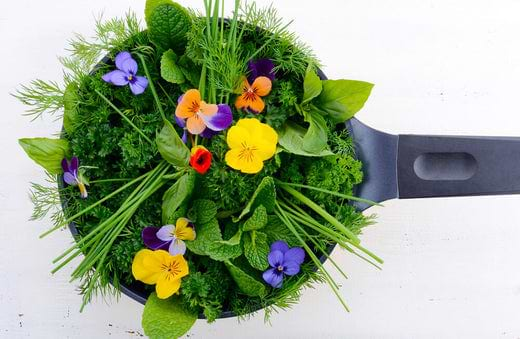
5 Herbs You Should Be Using In The Kitchen
Written by Erin SmithShare
In many cultures, there is a blurred line between food and medicine. In fact, many of our favorite foods and spice blends were first created for their medicinal purposes, including Moroccan ras-el-hanut and Ethiopian berbere. Beyond this, food is also a great way to get your daily dose of health-promoting herbs.
Incorporating herbs in your food is fun and bound to make you feel a bit like an expert chef. Especially when you see those who have always turned their nose up at herbs delightfully gobble up your latest creation.
Tonic, nutritive, and adaptogenic herbs work best in culinary creations. These herbs play an important role in supporting optimum health — strengthening your immune system, improving nutrition, and increasing vitality. They are gentle enough to take everyday and safe for all.
In fact in most cases, they work best when taken daily over longer periods of time.
Here are some great herbs to start with:
Goji Berries (Lycium chinense, L. barbarum)
Goji berries help support your immune system and healthy blood sugar levels, and are extremely high in free radical scavengers. They were traditionally eaten to instill strength and maintain youthful vitality. Regular consumption can support healthy cholesterol levels, improve gut flora, and strengthen the liver's ability to clear toxins from the body. They are also a great tonic to help maintain healthy vision.
Truthfully, they are delicious enough to pop right in your mouth and eat straight up. But they are fun to play with in the kitchen, too. Add them to granola and trail mixes. Powdered goji berries can be added to smoothies, tomato sauces, and your favorite treats (including cakes, muffins, and rice pudding). Try adding whole or powdered berries to your next cookie recipe.
Siberian Ginseng (Eleutherococcus senticosus)
Siberian Ginseng, or Eleuthero as it's affectionately called, is a classic adaptogen. Adaptogens are herbs that help your body deal with stress, and are deeply supportive and balancing. They are great to take every day. Eleuthero is a great adaptogen to add to food because of its mild flavor. Unlike the more well-known Asian Ginseng (Panax ginseng), Eleuthero is more neutral in temperature and relatively mild, making it suitable for men and women, elderly and the young. It is high in free radical scavengers, supports healthy cholesterol levels and strengthens your immune system, helping to reduce the frequency of common bugs. It supports endurance and stamina and is excellent for the type A person who is always on the go — busy moms, take note!
You'll want to use Eleuthero in powdered form. Add some to your favorite baked goods, substituting ¼ to ½ cup of powdered Eleuthero for the same amount of flour. It blends well in smoothies, sauces, mashed potatoes, cheesy dishes, and your favorite dips.
Stinging Nettle (Urtica dioica)
Nettle is finally getting the attention it deserves these days and nettle recipes can be found on many mainstream sites. This is one of the best wild greens and highly nutritious. Nettle is packed full of calcium, magnesium, zinc, potassium, vitamins A and C, and a bunch of other nutrients that are lesser-known but essential to vibrant health. It is one of the highest plant sources of protein and a wonderful all-around tonic. Its rich chlorophyll content makes it great for those that tend to feel weak and run-down and its natural histamine calming compounds help to ease seasonal allergies. When it comes to food, most of the attention is focused on many delicious ways to use fresh Nettles. But if you don't live in an area where Nettles are abundant, don't let that stop you. Dried Nettles can also be used in delicious ways. It has a mild green flavor making it easy to add to a variety of dishes.
Keep some dried Nettles next to your stove and sprinkle in your soups, sauces, quesadillas, pasta dishes, tacos and more. Add a tablespoon or two of powdered Nettles to your favorite hummus recipe or black bean dip. For some fun and to make Dr. Seuss proud, add to scrambled eggs to create your own nutritious version of green eggs.
Astragalus (Astragalus membranaceus)
Astragalus is one of the most commonly used herbs in Chinese medicine. The mild and slightly sweet root, like Eleuthero, is an adaptogen. Astragalus nourishes your immune system and works best when taken as a tonic and over longer periods. Traditionally, it was used to raise metabolism and strengthen the digestive system, lungs and heart.It also supports healthy cholesterol and blood sugar levels.
Add pieces of the root to chicken or vegetable stocks to make your soups bowls of immune-boosting goodness. Powdered Astragalus can be added to smoothies, sauces, dips, bread and other homemade treats. While relatively mild, the powder is stronger in flavor then Eleuthero so you might want to start with smaller quantities so as not to ruin the taste of a favorite recipe.
Hawthorn (Crataegus spp.)
This beautiful plant is a great heart tonic and works best when taken daily for at least three months. It is a wonderful supportive herb for those who want to support the health of their cardiovascular system.
It has a wonderful balancing ability and supports healthy blood pressure levels. Research has shown that it increases the nutrients that reach the heart, helping it stay healthy and improve its overall function, while also strengthening veins, improving circulation, and maintaining healthy cholesterol levels (Dalli et al., 2011; Wang et al., 2013).
If you are lucky enough to have fresh hawthorn near you (it's often planted as an ornamental), you can make fruit leathers from the red berries in the fall.
Infuse hawthorn berries in vinegar to make your own hawthorn vinegar and to salad dressings and other recipes calling for vinegar.
Add powdered hawthorn to sauces, stewed fruit, oatmeal, cookies, and other homemade treats. Other herbs work great in food as well.
Keep in mind that adding herbs to food works best for tonic and supportive herbs. It is not a way to consume herbs you need to take in therapeutic doses. Before experimenting with adding other herbs, make sure they meet the following criteria:
- mild and safe for all ages to consume
- mild in flavor or has a pleasant flavor of its own that can enhance your recipes
- is considered a tonic, nutritive or adaptogenic herb
Happy cooking!
References
- Dalli E, Colomer E, Tormos MC, Cosin-Sales J, Milara J, Esteban E, Saez G (2011) Crataegus laevigata decreases neutrophil elastase and has hypolipidemic effect: a randomized, double-blind, placebo-controlled trial, Phytomedicine, 18(8-9), 769-75.
- Wang J, Xiong X, Feng B (2013) Effect of Crataegus usage in prevention: an evidence-based approach, Evidence Based Complimentary and Alternative Medicine.
Erin Smith has been working with plants for 25 years and is medical herbalist and ethnobotanist. She is the creator of Plant Passionate Living, an interactive program designed to help people find greater health and vitality through a deeper relationship with plants. Erin is the Founder and Director of the Center for Integrative Botanical Studies.
For educational purposes only. This information has not been evaluated by the Food and Drug Administration. This information is not intended to diagnose, treat, cure, or prevent any disease, or sell any product.




















